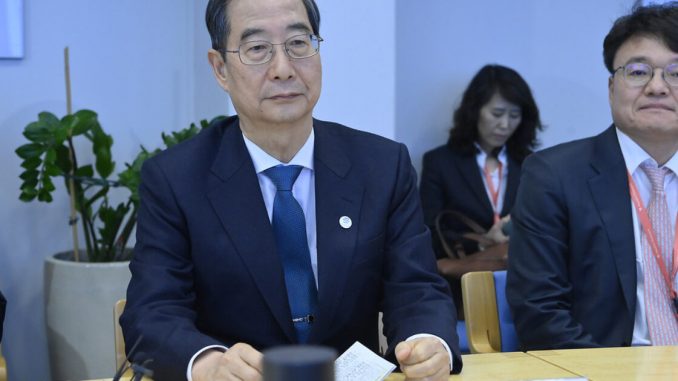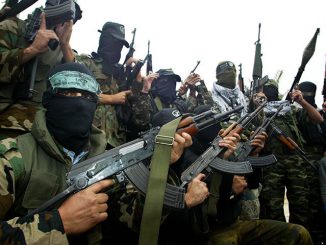
Former South Korean Prime Minister Han Duck-soo – IAEA image bank on flickr – FAO/Dean Calma
| Published August 26, 2025
When news broke that a special prosecutor in South Korea had filed an arrest warrant against a leading opposition candidate, the headlines immediately rippled through Seoul’s political circles. But outside the country, the story raised an uncomfortable question: is this a case of justice being served, or politics being weaponized?
A Familiar Script
Observers couldn’t help but notice the striking resemblance to tactics often seen in U.S. politics. Over the past few years, the Democrat Party has normalized the use of lawfare—leveraging prosecutors, investigations, and indictments against political rivals. Whether it’s Donald Trump facing an endless barrage of cases or conservative activists targeted under vague statutes, the precedent is clear: the courtroom has become an extension of the campaign trail.
South Korea, a nation deeply intertwined with American politics and culture, seems to have absorbed this playbook. The arrest warrant for an opposition figure is not merely a legal matter; it’s a political maneuver that mirrors the very same “lawfare” strategy that Democrats have perfected in Washington.
Legal Battle or Political War?
The charges themselves may carry weight—or they may collapse under scrutiny. But the timing tells another story. Issuing such warrants during an election season is rarely a coincidence. Critics argue this is less about justice and more about tilting the playing field before voters head to the polls.
South Korean politics has long been passionate, polarized, and turbulent. Yet this latest move underscores a shift: judicial tools are now openly wielded as partisan weapons. In a democracy, where the ballot box is supposed to be decisive, the courtroom is beginning to overshadow the voting booth.
Echoes of Washington
For Koreans, this is more than local drama—it’s a reflection of how America’s political trends ripple abroad. The Democrat Party’s approach to opponents has shown the world that weaponizing the justice system can be effective, even if it undermines public trust.
Now, South Koreans are learning the hard way. What happens when the opposition candidate is knocked out of the race not by voters, but by a judge’s order? What happens to faith in institutions when the law is seen as partisan?
The Bigger Picture
If America sets the standard, others will follow. The Korean case proves that political lawfare is not an isolated tactic but a global export. It also raises a cautionary flag: once this genie is out of the bottle, it’s nearly impossible to put back in.
The real losers in this cycle of weaponized prosecutions are ordinary citizens. Whether in Seoul or Washington, voters deserve a fair fight—at the ballot box, not in the courtroom.
 Implications
Implications
-
Erosion of Democratic Trust
When prosecutors appear to act as political operatives, citizens lose faith in both the justice system and the electoral process. South Korea risks importing the same deep mistrust now seen in the United States, where nearly half the population views prosecutions of political leaders as partisan. -
Normalization of Lawfare
What starts as a one-time tactic quickly becomes standard practice. If the ruling side can weaponize prosecutors, the opposition will adopt the same approach when power shifts. Politics then becomes a cycle of investigations, indictments, and arrests—while policy and governance take a back seat. -
Chilling Effect on Opposition
Candidates may think twice before challenging incumbents if running for office means risking prison. That undermines competition, limits voter choice, and leaves ruling parties with near-unchallenged power. -
Regional Geopolitical Signal
Allies and adversaries alike are watching. A politically charged prosecution in South Korea may weaken its image as a stable democracy, potentially emboldening China or North Korea to exploit internal divisions. -
Export of U.S. Political Playbook
This episode highlights how American political strategies—particularly from the Democrat Party—are influencing democratic norms abroad. Lawfare, once a Washington phenomenon, is now being replicated in Seoul, and could spread further in Asia and beyond. -
Public Backlash Potential
There is always the possibility that voters will see through the tactic. In the U.S., indictments against Trump only hardened his support base. South Korea could see a similar dynamic, where attempts to sideline an opposition candidate backfire and strengthen the very movement prosecutors hoped to suppress.
 Overall Takeaway:
Overall Takeaway:
The arrest warrant against South Korea’s opposition candidate is more than a legal development—it is a political statement with consequences far beyond one election. By following a path pioneered by the Democrat Party in the United States, South Korea risks undermining the very foundation of its democracy. Courts and prosecutors are supposed to safeguard justice, not tilt the electoral field.
If lawfare becomes the new norm, both Seoul and Washington face the same danger: a democracy where voters no longer believe their voice matters, because the outcome can be decided in a courtroom instead of at the ballot box. What begins as a tactic to weaken opponents could end as a crisis of legitimacy for entire systems of government.
In the end, the question Koreans—and Americans—must confront is simple: do we want leaders chosen by prosecutors, or by the people?





Be the first to comment